Key takeaways:
- Embracing constructive feedback is crucial for personal growth, helping to identify blind spots and refine skills.
- Continuous feedback encourages a growth mindset and fosters a culture of collaboration, enhancing team dynamics.
- Implementing structured feedback mechanisms, such as code reviews and user testing, leads to significant improvements in both individual and project outcomes.
- Tracking progress and reflecting on feedback enhances self-awareness, accountability, and continuous development in skills and practices.
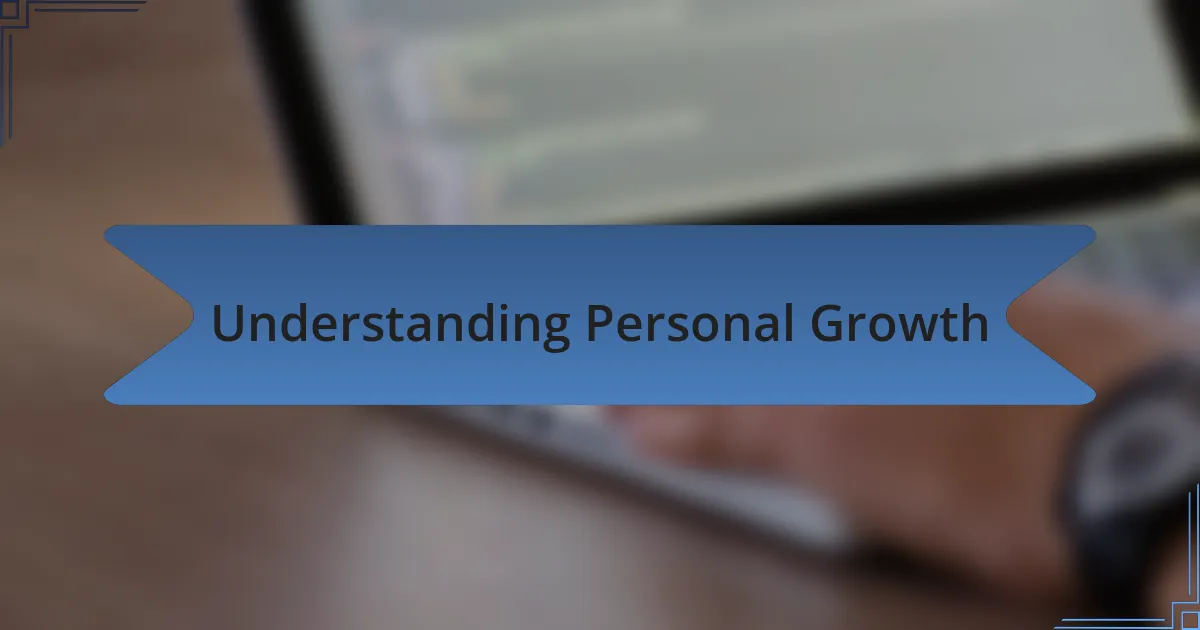
Understanding Personal Growth
Personal growth is a nuanced journey, often shaped by our experiences and interactions. I remember receiving feedback early in my career that was hard to swallow, yet it sparked a pivotal change in my approach to problem-solving. How often do we shy away from constructive criticism because it challenges our comfort zone?
The role of feedback in personal growth can’t be overstated. I’ve had moments where colleagues pointed out my tendency to overlook details in code, which initially felt discouraging. Yet, that very feedback pushed me to cultivate a meticulous mindset that I now cherish. Don’t we all have blind spots?
Embracing feedback can feel daunting, but it acts as a mirror, reflecting areas for improvement. There was a time when I hesitated to seek suggestions on my projects, thinking it showed weakness. But each piece of constructive feedback I’ve received now fuels my desire to learn and grow. Isn’t it fascinating how vulnerability can lead us to profound insights?
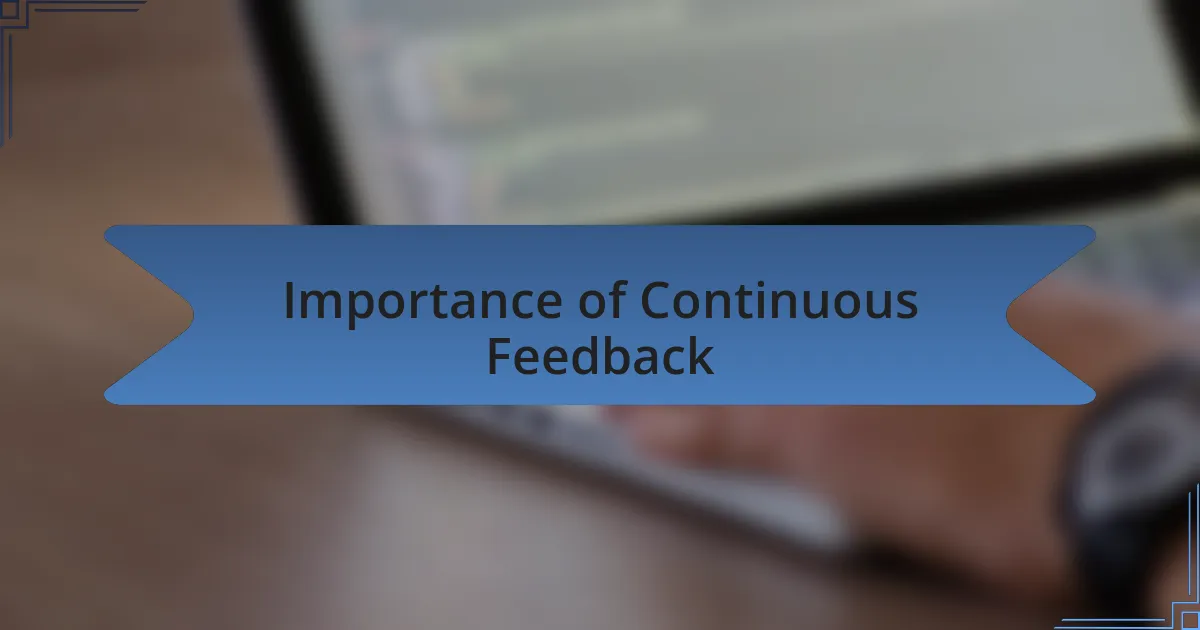
Importance of Continuous Feedback
Continuous feedback is like a compass guiding us through our professional journey. I remember a project where I received mid-development input that pointed out inconsistencies in my code. Initially, I felt defensive, but looking back, that feedback not only refined my skills but also taught me the value of collaboration in software development. Have you ever found that feedback reshapes your perspective?
The practice of seeking and giving feedback fosters a culture of openness. I once participated in a code review session where my peers provided insights that transformed my understanding of best practices. At first, I was anxious about their critiques, but over time, I learned that this exchange of ideas cultivated an environment where everyone felt empowered to express their thoughts. Doesn’t it make a difference when we feel supported by our team?
An ongoing feedback loop encourages a growth mindset, where challenges are embraced rather than avoided. I can recall a time when a senior developer sat down with me to discuss my approach to a complex feature. His insights illuminated blind spots I hadn’t recognized, reminding me that continuous learning is essential in our ever-evolving field. Isn’t it interesting how feedback can turn obstacles into opportunities?
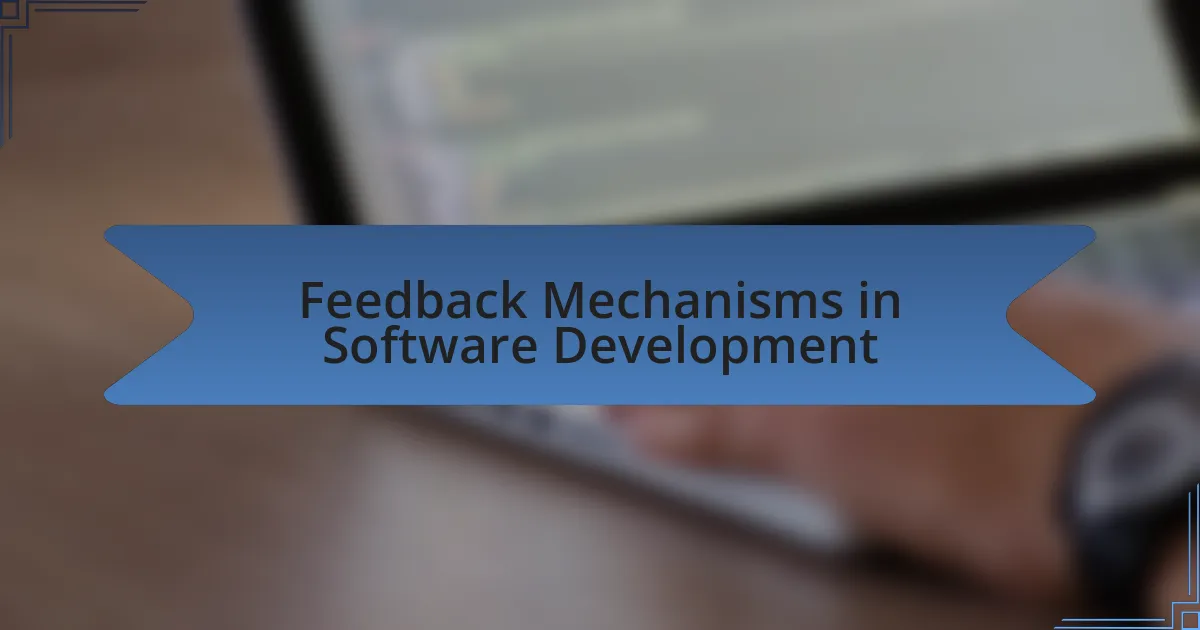
Feedback Mechanisms in Software Development
Feedback mechanisms in software development can take various forms, each serving to enhance our skills and work quality. In my experience, implementing tools like pull requests or code reviews has been transformative. I remember a specific instance where a colleague overlooked some performance issues in my code during a pull request. That moment made me realize how collaborative feedback creates a safety net, catching potential pitfalls before they escalate.
Another valuable feedback mechanism is user testing, which provides insights directly from the end-users’ perspective. When I was involved in a project rollout, gathering real-time user feedback revealed features I thought were intuitive were causing confusion instead. This was uncomfortable, but it underscored the importance of listening to users—after all, who better to inform us about their needs than those who use our software?
Lastly, retrospectives have become a staple in my workflow. I participated in a sprint retrospective where we dissected what went well and what didn’t. At first, I found it unsettling to open up about failures in front of the team. But I discovered that these discussions not only fostered trust but also inspired collective growth. Have you ever felt the power of shared reflection in your projects? It’s exhilarating to see how honesty can pave the way for innovation.
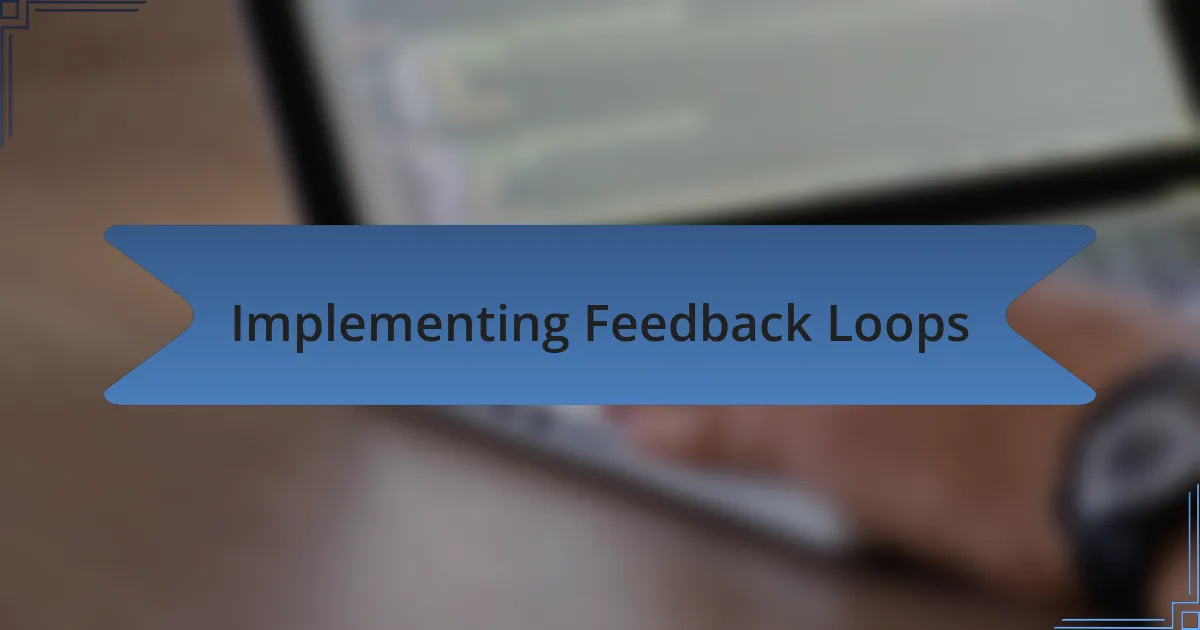
Implementing Feedback Loops
Implementing effective feedback loops is crucial for personal and team development in software projects. One approach I often encounter is the daily stand-up meeting, where team members share updates and challenges. I vividly recall a day when I mentioned a roadblock I was facing; the immediate suggestions from my teammates not only helped me overcome it but also reinforced my belief in the value of open communication. Have you ever had a breakthrough simply by sharing your struggle?
Another method I’ve found invaluable is using automated feedback tools integrated within our deployment pipeline. I remember launching a new feature, anxiously awaiting feedback from our CI/CD process. When the tests highlighted a crucial bug before anyone else could, I felt a moment of triumph. It was like having a safety net that caught me before I fell, ensuring our product maintained its quality and reliability.
In addition, I’ve learned to embrace one-on-one feedback sessions with peers. I can recall a session where a colleague pointed out how my communication style might be misinterpreted during demos. Initially, I felt defensive, but after reflecting on their input, I realized that adjusting my approach could foster better understanding. This kind of feedback isn’t just about correction; it’s an opportunity to grow and connect on a deeper level. Have you tried engaging in this kind of dialogue? It’s amazing how much we can learn from each other.
![]()
Tracking Personal Progress
Tracking my personal progress is an insightful journey that I approach with purpose. I remember setting specific goals after a feedback session with a mentor who helped me pinpoint areas for improvement. By documenting my achievements and setbacks in a weekly journal, I not only kept a clear record of my progress but also cultivated a sense of accountability. How often do we stop to reflect on our journey?
Another technique I find beneficial is using visual aids, like progress charts. There was a time when I created a simple bar graph to track my learning in a new programming language. Each time I completed a project milestone, I would fill in a bar. It was incredibly satisfying to see my progress represented visually, and it motivated me to push further. Have you ever visualized your progress? It’s amazing how an image can ignite your drive.
Lastly, I often take time to revisit past feedback, especially from peer reviews. I recall receiving constructive criticism on a complex code I had written. By periodically reflecting on that feedback, I can see how it has shaped my current coding practices and helped me grow. Tracking my progress in this way not only highlights my development but also reinforces a learning mindset. What lessons are you holding onto that can guide you forward?
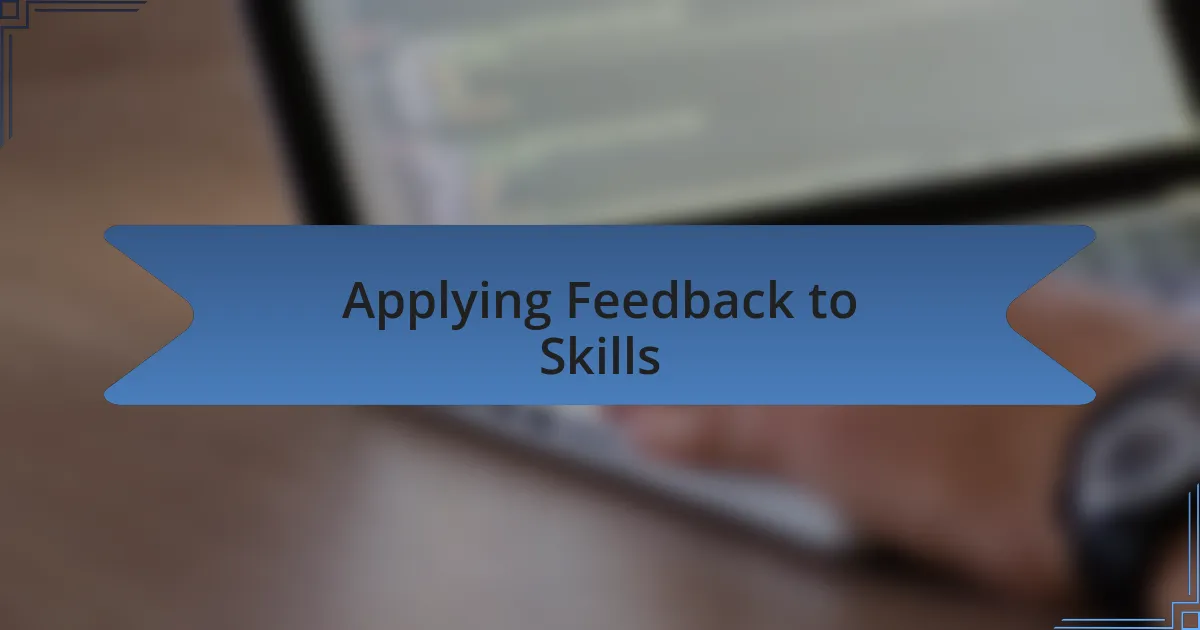
Applying Feedback to Skills
Applying feedback to skills is one of the most transformative aspects of personal growth, especially in software development. I remember a time when a senior developer pointed out my tendency to overcomplicate code. Instead of seeing this as a setback, I viewed it as a critical opportunity for improvement. By actively seeking to simplify my code and applying this feedback, I noticed a remarkable improvement in both my coding efficiency and my ability to communicate solutions clearly. Have you ever changed your approach simply because someone offered a different perspective?
In another instance, paired programming sessions became a goldmine for real-time feedback. I vividly recall a challenging debugging session where I was stuck on a particularly perplexing issue. My partner’s suggestions not only helped me identify the bug but also taught me a streamlined methodology for future debugging. This kind of collaborative feedback is invaluable; it not only sharpens my skills but also fosters a sense of camaraderie. Could working alongside others change how you absorb feedback?
Feedback isn’t just beneficial; it’s essential for honing specific competencies. When I began focusing on unit testing, I received insightful critiques that highlighted gaps in my understanding. By taking their suggestions seriously and implementing them into my practice, I gained confidence and competence in writing tests. This iterative process of learning, applying, and refining through feedback is not just about improving one skill—it’s about continuously evolving as a developer. How often do you revisit feedback to ensure it aligns with your current goals?
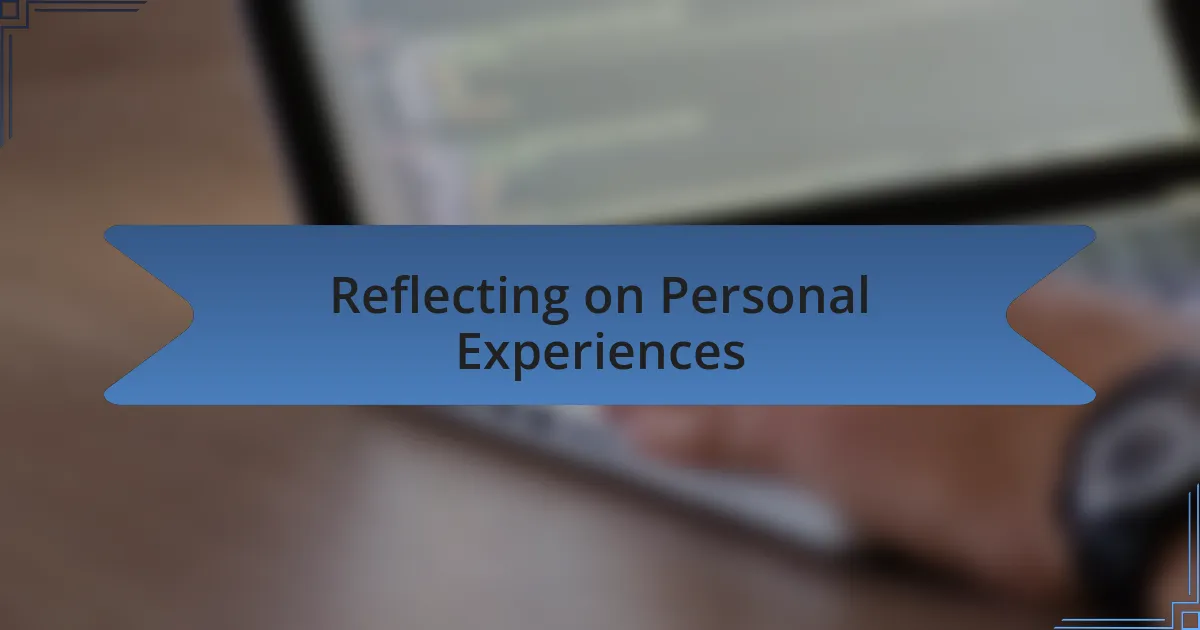
Reflecting on Personal Experiences
Reflecting on my personal experiences with feedback has often revealed deeper insights than I initially expected. I recall a time when a peer reviewed my project and pointed out not just the hows but the whys of my design choices. At first, I felt defensive, but taking a step back allowed me to appreciate that their perspective opened my eyes to user needs I hadn’t considered. Have you ever hesitated to embrace criticism, only to find it was exactly what you needed to grow?
There was another moment that stands out to me: I once received feedback after a presentation that highlighted my nervousness and unclear explanations. Initially, it felt disheartening, but that constructive critique spurred me to practice more, improving both my presentation skills and my confidence. I began to see feedback as an invitation rather than an attack. Doesn’t reframing feedback like this encourage us to become better versions of ourselves?
In my journey, I’ve learned that reflecting on feedback goes hand in hand with self-awareness. After implementing advice from a mentor about code readability, I began to notice not just improvement in my own work but also an enhancement in team collaboration. It struck me how making concepts clear for others also created a ripple effect of growth within our team. How might your experiences change if you viewed each piece of feedback as a stepping stone for both personal and team development?